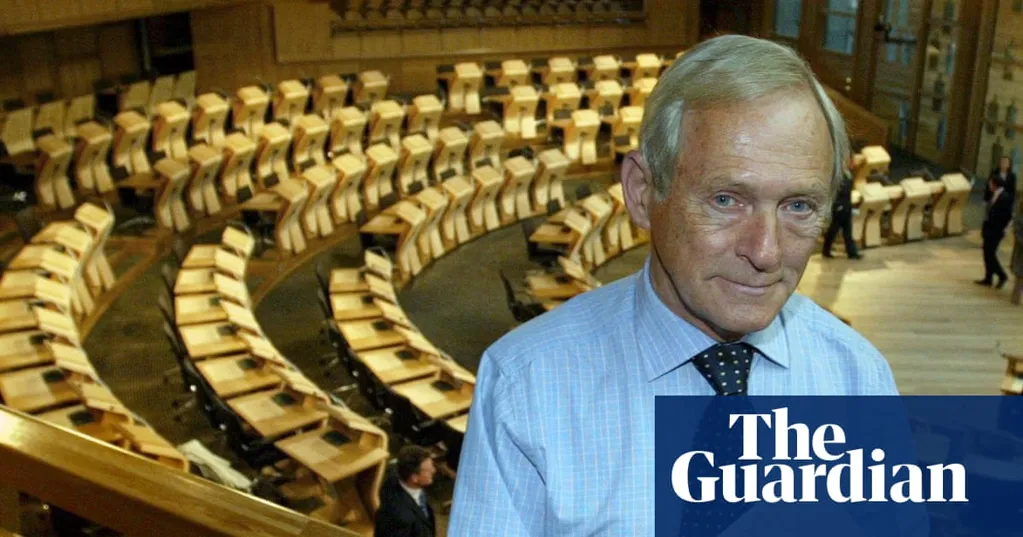Sir George Reid, who has died aged 86, was a Scottish politician, broadcaster and all-round public figure who also spent a dozen years as director of public affairs for the International Red Cross and Red Crescent in Geneva, a post he held between two separate phases of his political career.
Reid was elected as a Scottish National party MP to the House of Commons in the general election of February 1974, but lost his seat five years later. Twenty years on he was elected to the new Scottish parliament, and in 2003 became its second presiding officer.
Reid later reflected that in his 12 years with the Red Cross he "did far more good than at any other time in my life". As well as overhauling the organisation's image and communications strategy, he served on the frontline in war and disaster zones around the world, including following the Ethiopian famine and the 1988 Armenian earthquake.
Joining the Red Cross in 1984, he was soon embroiled in the famine work, noting later that "about 5 million people were going to die unless we got food to them and it had been left too late by the African authorities". He used his broadcasting connections to encourage the BBC to make Michael Buerk's documentary film on the topic, which, in turn, inspired the Live Aid movement.
In 1990 he co-wrote, with Michèle Mercier, an influential study of Red Cross and Red Crescent identity, which found that both bodies had excellent trust levels at a national level, but much less so internationally, with many people believing them to be "an agency of government, or a Swiss organisation or 'something to do with the United Nations'". The study's recommendations led to lasting changes in the mission statement of the organisation, plus a greater public emphasis on its independence from governments and its frontline work in the face of wars and disasters.
Reid was born in Tullibody, Clackmannanshire, to George, a company director, and Margaret (nee Forsyth). He was educated at Tullibody school, Dollar academy and St Andrews University, where he graduated with first-class honours in Russian history and was president of the Students Representative Council.
Afterwards he went into journalism, initially as a features writer with the Daily Express, but quickly moving to television with STV, where he became well-known as a personable presenter and political reporter, before joining the BBC in 1968. Along with his strong local credentials, this recognition factor made him an ideal SNP candidate for his home seat of Clackmannan and Eastern Stirlingshire.
In February 1974 he gained the seat from Labour as one of seven SNP candidates elected. Eight months later that tally increased to 11. At Westminster he became a member of the UK delegation to the Council of Europe and specialised in international affairs. At home his media skills were well utilised by his party as its spokesman on health.
However, Reid later said that during these years the party was riven by "constant struggles over power and purpose" between SNP MPs in London and headquarters in Edinburgh. The SNP lost nine of its 11 MPs in the 1979 general election after they voted with Margaret Thatcher in her confidence vote to bring down the Callaghan government. Reid lost his seat by fewer than 1,000 votes.
Initially he returned to broadcasting as a documentary maker and current affairs presenter for BBC Scotland, before taking up his post in Geneva. By the mid-1990s he was again active in SNP politics. After failing to be elected in the Ochil constituency in the 1997 general election, he became a regional MSP for Mid Scotland and Fife two years later. He lost out to David Steel in a bid to become the parliament's first presiding officer, but was eventually elected to the post four years later.
Far from being the consensual institution that many of its advocates had hoped for, Holyrood turned out to be a fractious place, with the costs of the parliament building itself one of the main bones of contention. Reid, who was generally seen as a calming figure during this period, told his fellow MSPs: "I sometimes wish that in this building we could do what we did in Africa when it comes to problem solving - all sit under a tree for three days until we've cracked it. Just talk and talk and talk. It can be a slow process, but by and large you come to almost universal consensus and it's not a bad way of doing business."
While he remained firm in his pro-independence views, Reid's reputation as a conciliatory figure opened up to him a series of public roles after he retired from Holyrood in 2007. These included chairing a review of the Northern Ireland Assembly in an attempt to give it "a fresh start", and membership of the EU's Caucasus-Caspian diplomatic commission. At home he was the Queen's high commissioner to the General Assembly of the Church of Scotland and was made a Knight of the Order of the Thistle in 2022.
He is survived by his wife, Daphne (nee McColl), whom he married in 1968, and their daughter, Morag.
